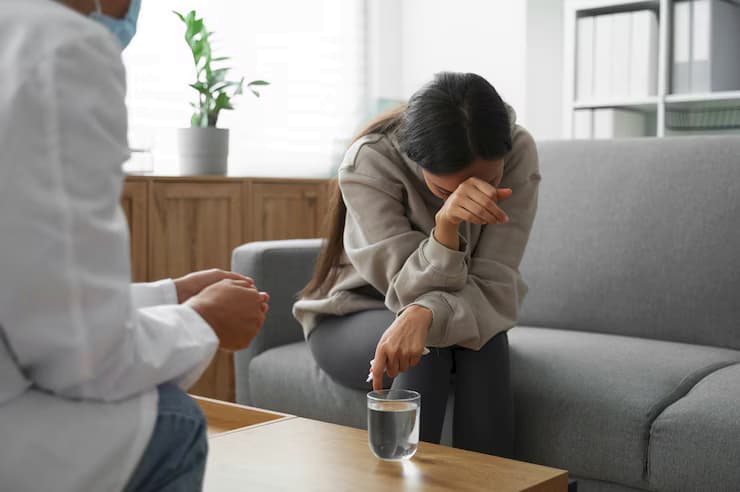What role do medications play in anxiety management?

Strong 8k brings an ultra-HD IPTV experience to your living room and your pocket.
Introduction
Anxiety affects millions of individuals worldwide. Although lifestyle changes and self-help techniques can be helpful in managing anxiety, medication is sometimes a vital component of treatment. This article will examine the role of medication in anxiety management. We will look at the different types, their mechanisms, and circumstances where they might be recommended.
Understanding Anxiety Disorders
It's important to understand anxiety disorders before tackling the topic of medication. Anxiety disorders include a variety of conditions such as generalized anxiety disorder (GAD), panic disorder (PAD), social anxiety disorder (SAD), specific phobias and post-traumatic anxiety disorder. These disorders are marked by excessive, often irrational anxiety or fear. This can have a significant impact on an individual's well-being and daily life.
Although psychotherapy, lifestyle changes, and self-help techniques are important components of anxiety management (including medication), they can be helpful in situations where symptoms are severe or disabling, not responding to other interventions, etc.
Types of medications for anxiety management
To manage anxiety, a variety of medication classes are available. Each class of medications has a distinct mechanism of action, and each is suitable for different anxiety disorders. Most commonly prescribed anxiety medications include:
Antidepressants are commonly prescribed to treat anxiety disorders. They include selective serotonin reuptake inhibitors (SSRIs), serotonin-norepinephrine reuptake inhibitors (SNRIs), and tricyclic antidepressants. These medications work primarily by increasing the availability in the brain of neurotransmitters such as norepinephrine and serotonin. Sertraline (Zoloft), and escitalopram, (Lexapro), are two of the most commonly prescribed SSRIs to treat anxiety.
Benzodiazepines - Benzodiazepines provide relief for anxiety symptoms quickly. They work by increasing the calming effect of the neurotransmitter GABA in the brain. Benzodiazepines can include diazepam, (Valium), and alprazolam, (Xanax). Due to the potential for dependency and withdrawal symptoms, these medications are usually prescribed for short-term usage.
Buspirone is an antianxiety drug that works differently than benzodiazepines or antidepressants. It is a partial serotonin agonist and can be used to treat generalized anxiety disorder.
Beta-Blockers - Beta-blockers such as propranolol, (Inderal), can be used to treat physical symptoms of anxiety such as rapid pulse, tremors and sweating. They block the effects of the norepinephrine that is responsible for the "fight or flee" response.
Antipsychotic Medications. In certain cases, atypical medications such as quetiapine or olanzapine may be prescribed for anxiety symptoms. This is especially true when anxiety occurs in conjunction with another psychiatric condition.
What is the role of medication in anxiety management?
The use of medications can be very effective in managing anxiety, but it is important to consult with a professional before using them. Here are some of the ways that medications can be used to treat anxiety:
Medications are able to provide relief for anxiety symptoms. This is especially important when immediate relief is required, like during a panic episode.
The use of medications in conjunction with psychotherapy, such as cognitive-behavioral treatment (CBT), can enhance the effectiveness of the treatment. Medication can be used to provide relief from severe anxiety symptoms that prevent a person from engaging in therapy.
Long-Term Treatment: For chronic anxiety disorders such as generalized disorder of anxiety, medications may be prescribed to control symptoms for an extended period. Long-term management is commonly done with antidepressants.
Some medications are available to help prevent panic attacks or anxiety attacks from recurring. Beta-blockers can be taken prior to a stressful situation in order to reduce anxiety symptoms.
Addition to Lifestyle Changes: Medication can be used in conjunction with lifestyle changes, such as regular physical activity, healthy eating and stress-reduction techniques. Medication can reduce anxiety symptoms and make it easier to maintain healthy habits.
Precautions and Considerations
There are some important things to consider and take into account when using medications for anxiety management.
Individual Variation: Medication and dosage choices can vary greatly from one person to another. What is effective for one person may not work as well for another.
All medications can cause side effects. Discussing potential side effects and concerns with your healthcare provider is important.
Withdrawal and Dependency: Benzodiazepines in particular are associated with withdrawal symptoms and dependency. They are usually recommended for short-term usage. You should always follow the advice of your doctor when using these medications.
You should inform your doctor if you take any supplements or herbal remedies. These can have an impact on the safety and effectiveness of anxiety medication.
Regular Monitoring: If you are taking anxiety medications, it is important to regularly check in with your healthcare provider. This will allow them to monitor any side effects and adjust the dosage if necessary.
The duration of treatment with medication can vary. Some people may only need medication for a couple of months while others will require ongoing treatment. Consult your healthcare provider before making a decision.
Conclusion
The use of medications can be a valuable tool in the treatment of anxiety disorders. They can provide relief from distressing symptom, improve the effectiveness of therapy and help with long-term management. Medication should only be used as part of an overall treatment plan that may also include psychotherapy and lifestyle changes.
The decision to use anxiety medication should be made with the help of a healthcare professional who can evaluate the individual's needs, weigh potential risks and benefits and monitor the treatment progress. Individuals with anxiety who use medication in a well-informed and thoughtful manner can lead fulfilling lives and be free of anxiety.
https://apotheco.online/product-category/anxiety/xanax/
Note: IndiBlogHub features both user-submitted and editorial content. We do not verify third-party contributions. Read our Disclaimer and Privacy Policyfor details.







